The disclosure of a memo written by James B. Comey saying that President Trump had asked him to shut down the FBI’s investigation of former national security advisor Michael Flynn followed months of intrigue.
Trump has frequently belittled investigations underway into Russian meddling in the 2016 presidential election. His comments, often on Twitter, have only heightened the suspicions of his detractors about Russia’s ties to Flynn and other senior Trump campaign advisors.
Last month, Trump fired Comey. Democrats have accused the president of trying to obstruct the inquiry by ousting the man who had been heading it. The existence of a memo documenting private conversation between Comey and Trump, first reported by the New York Times, has set off widespread speculation that Trump could now be vulnerable to impeachment.
Here’s a timeline on the drama that has unfolded since Trump won the Nov. 8 election:
Nov. 8
Trump wins election
Trump, defying polls, shocks the political establishment and beats Hillary Clinton to become the 45th president of the United States. It’s widely considered to be one of the biggest upsets in American political history.
Nov. 10
Obama warning
President Obama warns Trump during a 90-minute meeting at the White House that Flynn, a former U.S. Army lieutenant general and Defense Intelligence Agency chief, is a problem. The warning comes out in May during former acting Atty. Gen. Sally Yates’ testimony before Congress.
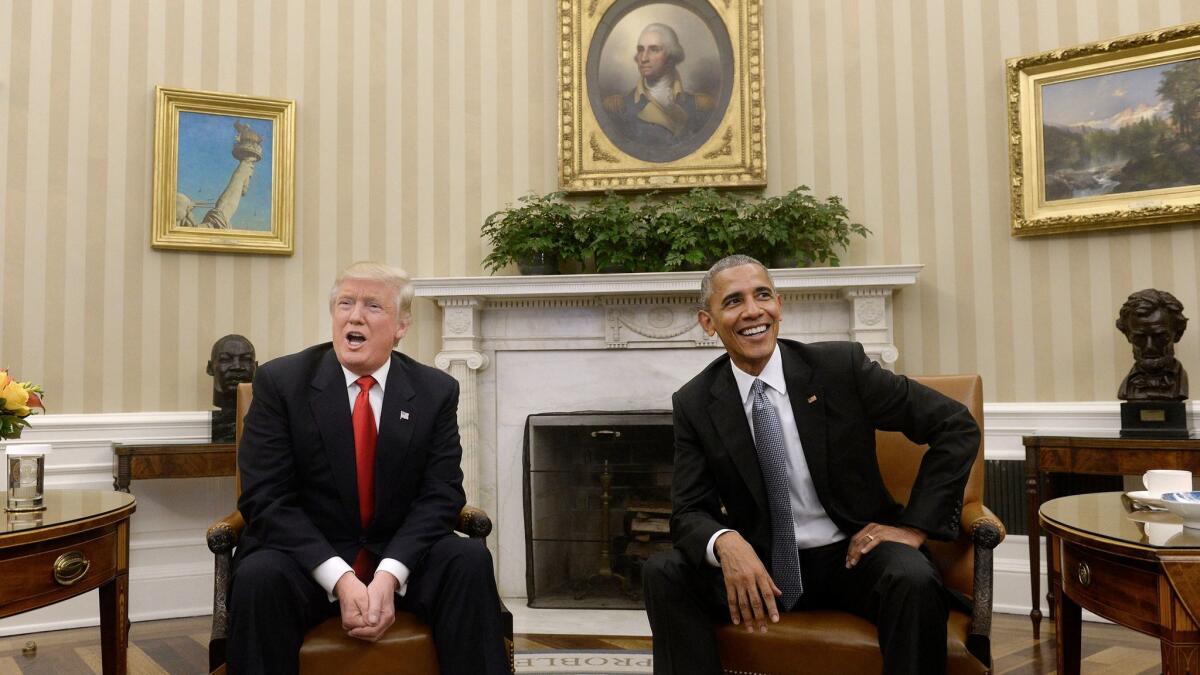
Nov. 14
Putin congratulates Trump
Putin calls Trump to congratulate him on his victory. According to a release by Trump’s transition team, the two men discuss “a range of issues including the threats and challenges facing the United States and Russia.” It goes on to add that Trump looks forward to “a strong and enduring relationship with Russia and the people of Russia.”
Nov. 18
Trump picks Flynn
Trump names Flynn as his choice for national security advisor. The decision is controversial. Flynn had attended a lavish dinner in Moscow in 2015 at which he sat next to President Vladimir Putin. He’d also received a speaking fee from a Russian government-run television network that U.S. officials consider a propaganda outlet.
Dec. 6
Flynn’s son out
Trump’s transition team cuts ties with Flynn’s son, who had spread false stories on Twitter.

Dec. 29
Sanctions imposed on Russia
TheObama administration imposes sanctions on Russia in retaliation for Russia’s hacking of the Democratic National Committee in the summer and other efforts to interfere with the U.S. election.
Dec. 29
Flynn contacts Russian ambassador
Flynn contacts Russian Ambassador Sergey Kislyak several times, including more than one telephone call.
Dec. 30
Putin responds
Putin says he will not retaliate against the U.S. sanctions, surprising the Obama administration. Trump praises Putin.
Early January
Flynn’s Russia connection
Intelligence officials, looking for clues to why Putin decided not to retaliate, discover Flynn’s conversations with Kislyak, whose communications the U.S. government routinely monitors.
Jan. 11
Trump speaks
At a news conference, Trump denies that he has ties with Russian officials.
Trump compares intelligence community practices to ‘Nazi Germany’ after dossier is leaked
Trump criticizes the U.S. intelligence community – comparing its practices to Nazi Germany – after a dossier, which suggested Russia had compromising information to use as blackmail against Trump, was leaked.
Jan. 12
News report
Washington Post columnist David Ignatius first reports on Flynn’s contacts with Kislyak. “What did Flynn say,” he asks, “and did it undercut the U.S. sanctions?” At a news conference, Trump again denies that he has ties with Russia.
Jan. 13
White House denial
Trump transition spokesman Sean Spicer denies that Flynn and Kislyak discussed sanctions.
Jan. 15
Pence defends Flynn
Vice President-elect Mike Pence, in an interview on CBS’ “Face the Nation,” denies that Flynn discussed sanctions with Kislyak. The timing was “strictly coincidental,” Pence said. “What I can confirm, having spoken to him about it, is that those conversations … had nothing whatsoever to do with those sanctions.”
Jan. 20
Inauguration
Trump takes the oath of office and is sworn in as the 45th U.S. president.
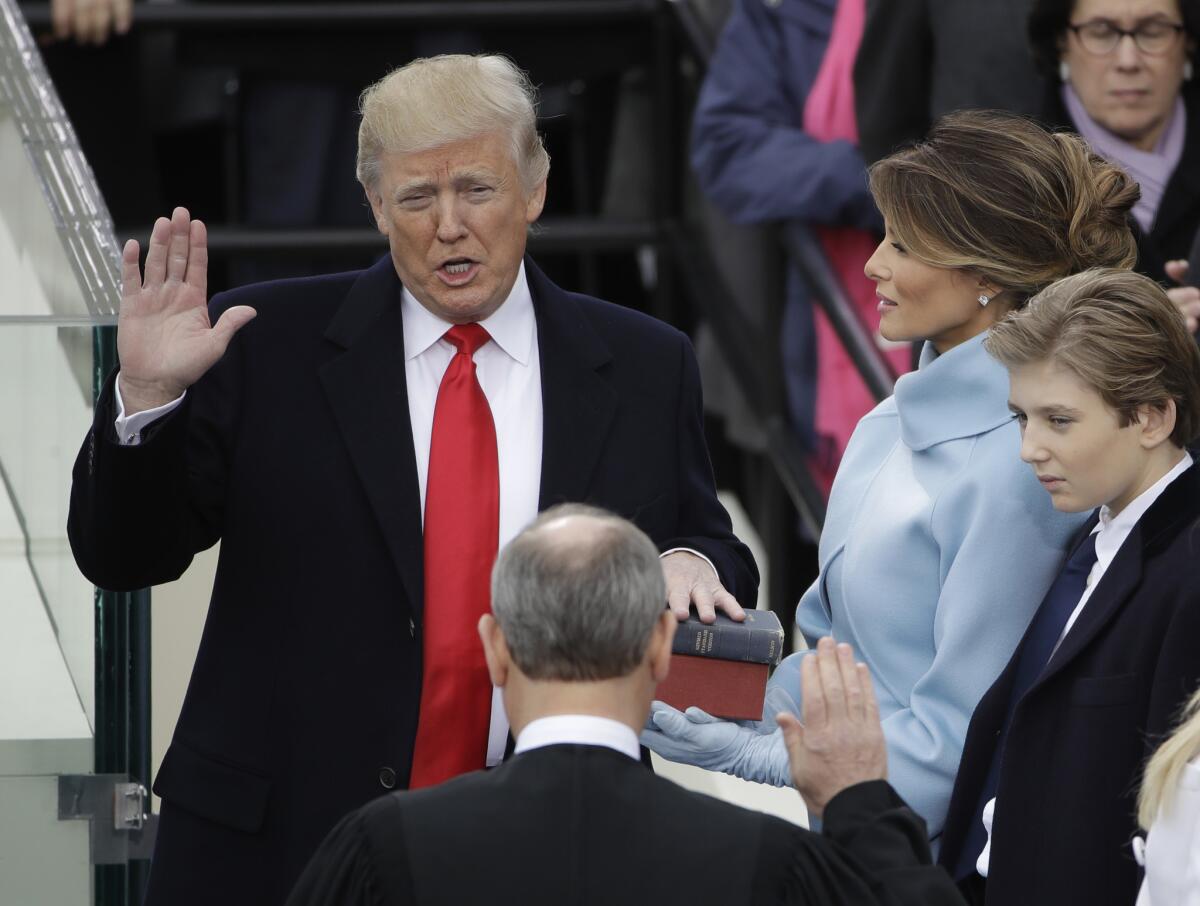
Jan. 21
Trump visits CIA
Trump visits CIA headquarters, lauding agents for their tactics.
“There is nobody that feels stronger about the intelligence community and the CIA than Donald Trump,” he said.
Jan. 22
Flynn starts his job
Flynn is sworn in as national security advisor.
During a public reception at the White House attended by Comey, Trump hugs his FBI director and affectionately says, “He’s become more famous than me.”
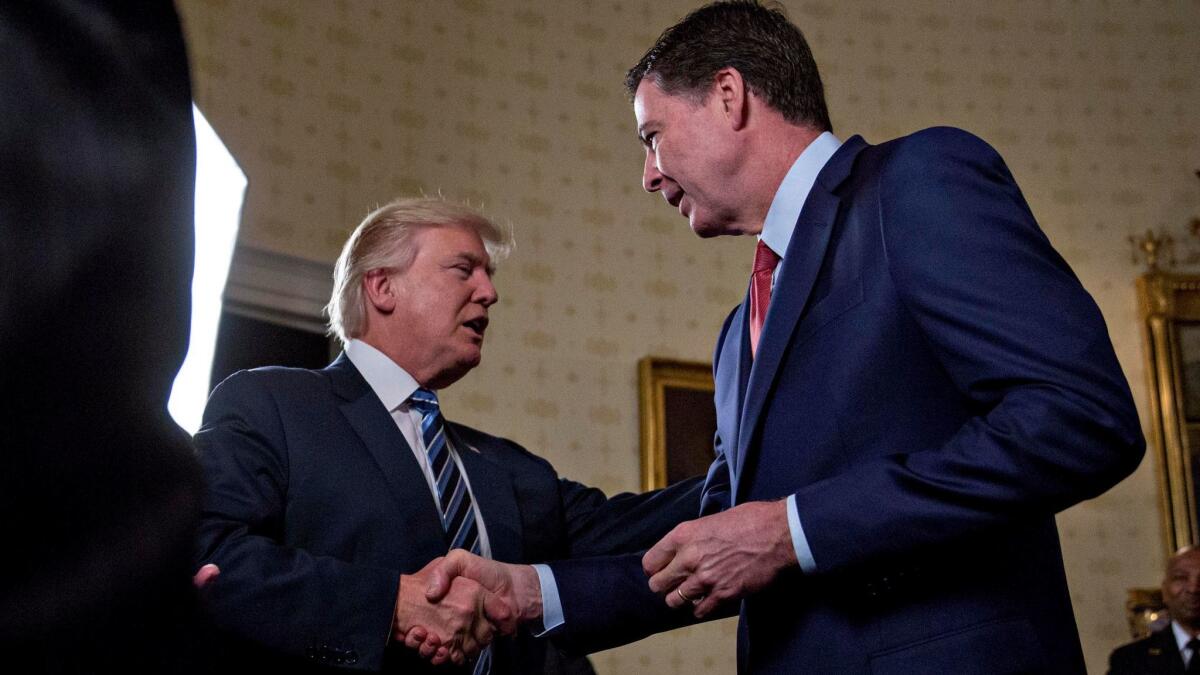
Between Jan. 20 and Jan. 21
FBI talks to Flynn
The FBI interviews Flynn. Flynn denies that he discussed U.S. sanctions against Russia with Kislyak, the Russian ambassador.
Jan. 23
Spicer says Flynn didn’t discuss sanctions
Spicer, now White House press secretary, tells reporters at the daily news briefing that he had talked with Flynn the night before about the calls with Kislyak and that there had been no discussion of sanctions.
Jan. 26
Yates warns White House
Yates, then the acting attorney general, tells White House Counsel Donald McGahn that Flynn and Kislyak had discussed the sanctions and that Flynn, having misled Pence and others, might be subject to Russian blackmail. McGahn briefs Trump.
Jan. 27
Comey dines with Trump
At a one-on-one dinner at the White House, Comey is asked by Trump for his loyalty, according to a New York Times report of the encounter published after Comey is fired in May. Comey reportedly tells him he can offer his honesty. Comey would corroborate that version of events in congressional testimony in June.
Jan. 28
Trump calls Putin from Oval Office
In a one-hour phone call made while White House aides look on, Trump and Putin discuss combating terrorism, confronting Islamic State militants, the crisis in Ukraine and the Iranian nuclear deal, according to a statement from the Kremlin.
The leaders agree to a set a possible date and venue for a personal meeting, and vow to maintain “regular personal contacts,” the Kremlin statement says. The call is among a number Trump places to world leaders.
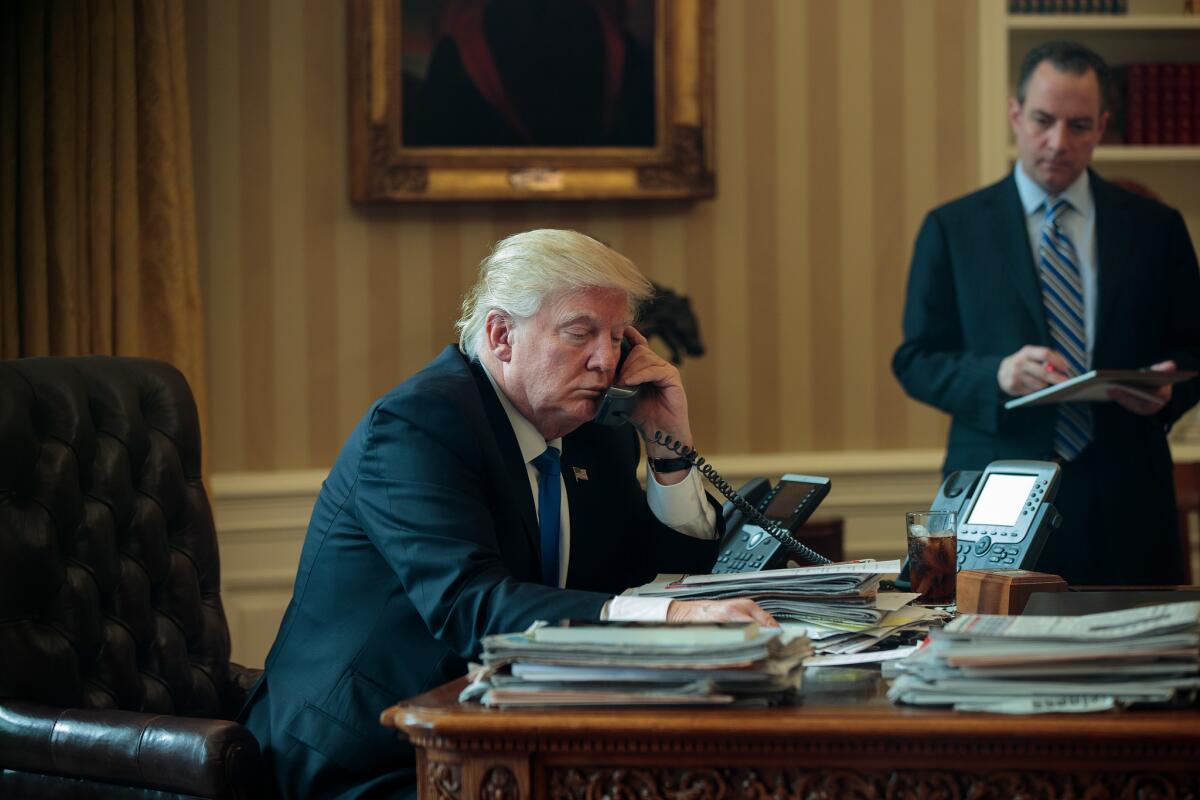
Feb 7
Trump tweets, ‘I don’t know Putin’
Trump responds to a controversy stemming from comments he made during an interview with Fox News’ Bill O’Reilly.
O’Reilly observed during the interview that Putin is “a killer.”
Trump answered: “You think our country is so innocent?”
Feb. 8
Another denial
Flynn, responding to questions from the Washington Post, once again flatly denies any discussions with Kislyak about sanctions.
Feb. 9
Denial retracted/Pence discovery
A spokesperson for Flynn retracts that denial, saying he does not remember talking about the sanctions but “can’t be 100% sure.”
Pence discovers for the first time, from a Washington Post article, that Flynn had misled him, his spokesman confirms. Pence subsequently learns that Trump had known about Flynn’s deception since Jan. 26, but hadn’t told him.
Feb. 10
Flynn calls Pence
White House officials say Flynn called Pence to apologize for misleading him. Trump, asked by reporters on Air Force One, says he is not familiar with the Post report.
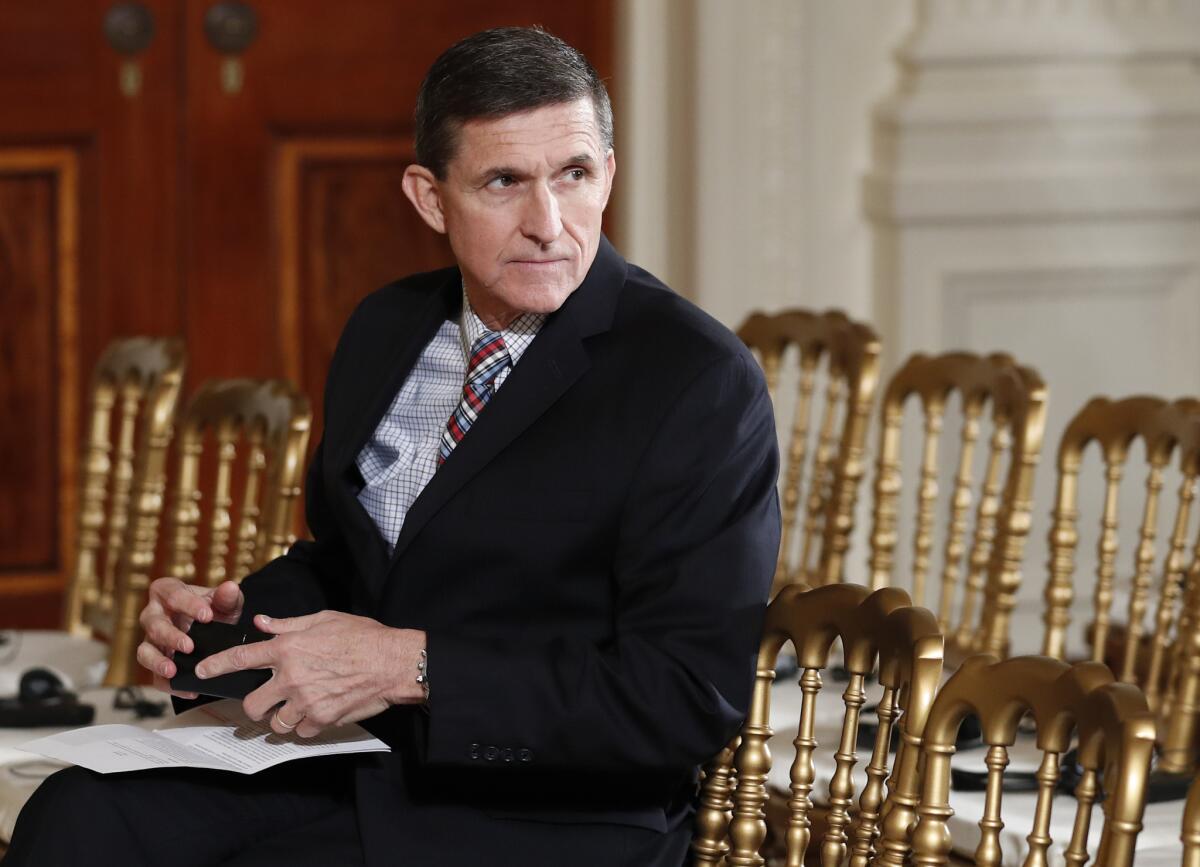
Feb. 12
White House aide appears on talk shows
White House advisor Stephen Miller, dispatched by the administration to appear on several Sunday TV interview programs, declines to say whether Trump has confidence in Flynn.
Feb. 13
Mixed messages, then Flynn resigns
4 p.m. ET
Trump advisor Kellyanne Conway says Flynn has Trump’s full confidence.
5 p.m. ET
Spicer says Trump is “evaluating the situation.”
9:30 p.m. ET
The Post and the New York Times disclose that Yates had warned the White House about Flynn’s conversations.
11 p.m. EST
White House announces Flynn’s resignation. Officials say he chose to step down.
Feb. 14
Eroding trust
Spicer says at the daily news briefing that the White House had been investigating Flynn’s conduct for more than two weeks and that he had been fired because of an “eroding level of trust.”
Several hours after Spicer’s briefing, Pence spokesman Marc Lotter says that the vice president “became aware of incomplete information that he’d received on Feb. 9 based on media accounts. He did an inquiry based on those media accounts.”
Feb. 14
Comey-Trump Oval Office meeting
Trump meets alone with Comey in the Oval Office and asks him to drop the investigation of Flynn, according to a memo of the encounter written by Comey and first reported May 16 by the New York Times.
“I hope you can let this go,” Trump said to his FBI director, according to the reports, later confirmed by Comey’s congressional testimony.
FEB. 15
Trump calls Russia story line ‘nonsense’
FEB. 16
Trump calls the Russia story line ‘fake news!’
FEB. 26
Trump, again, calls the Russia story line ‘fake news!’
March 20
Investigation confirmed
Comey confirms that the FBI is investigating possible collusion between the Trump campaign and Russian officials to influence the 2016 election.
March 22
Nunes visits White House
Rep. Devin Nunes (R-Tulare), who chairs the House Intelligence Committee, goes to the White House to review classified information regarding the Russia inquiry.
After the meeting, Nunes says that conversations by Trump transition officials may have been inadvertently picked up by U.S. surveillance.
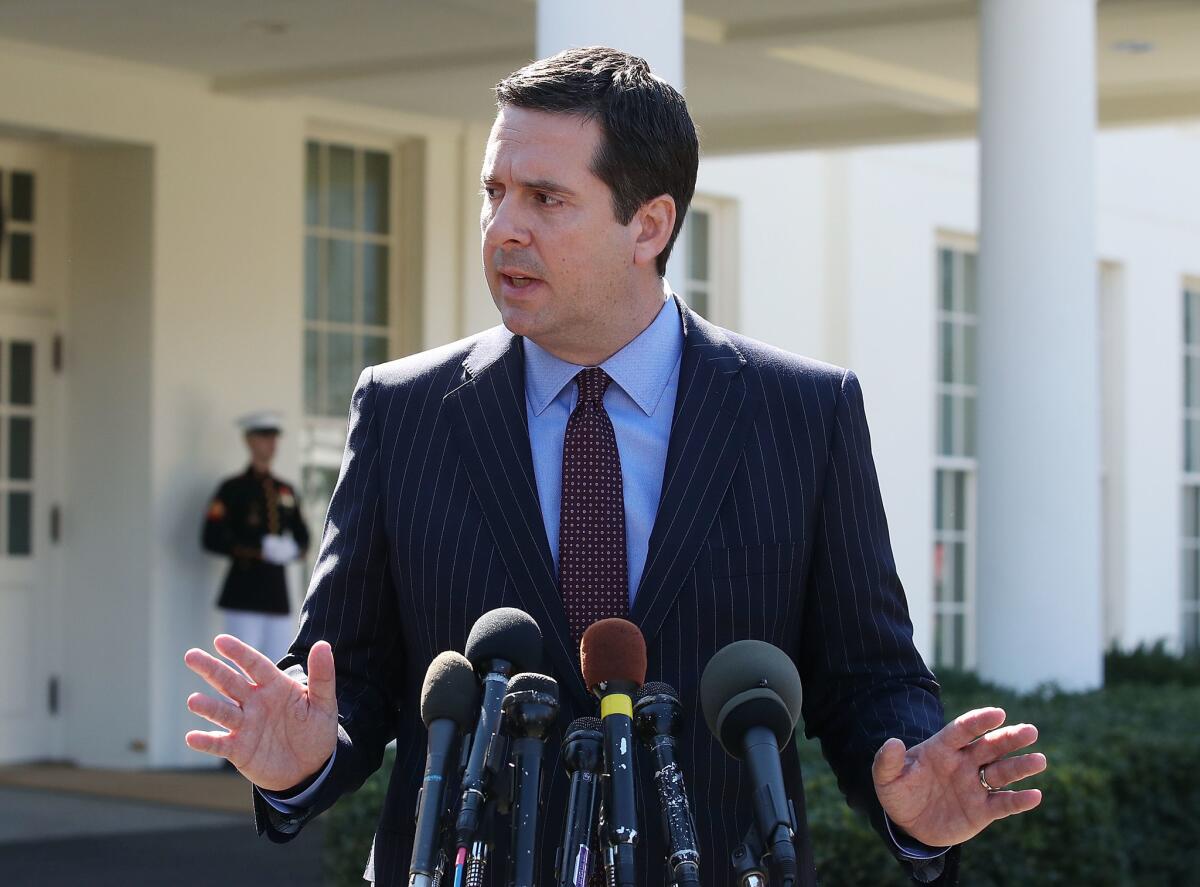
March 24
Hearings canceled
House Intelligence Committee’s Russia hearings are canceled indefinitely.
Late March
Flynn asks for immunity
Flynn asks for immunity in exchange for testifying to the House and Senate intelligence committees investigating Russia’s involvement in the 2016 election, negotiations that were first reported by the Wall Street Journal.
APRIL 1
‘Fake News Media’
April 3
Trump talks to Putin
Trump calls Putin to condemn a terrorist attack that killed 11 and injured dozens in a St. Petersburg subway. Putin was in St. Petersburg, his hometown, at the time of the attack.
April 6
Nunes steps aside
Nunes steps aside from the Russia investigation – because he himself is under investigation. The House Ethics Committee, in a separate announcement, said it was looking into allegations that Nunes had improperly disclosed classified material, the same material involved in his nighttime White House meeting. Rep. K. Michael Conaway (R-Texas) takes over as head of the Intelligence Committee’s Russia inquiry, with help from Reps. Trey Gowdy (R-S.C.) and Tom Rooney (R-Fla.).
April 11
Carter Page under investigation
The FBI obtains court permission to monitor the communications of Trump campaign advisor Carter Page since last summer, according to a Washington Post report. The U.S. believed he was acting as a Russian agent.
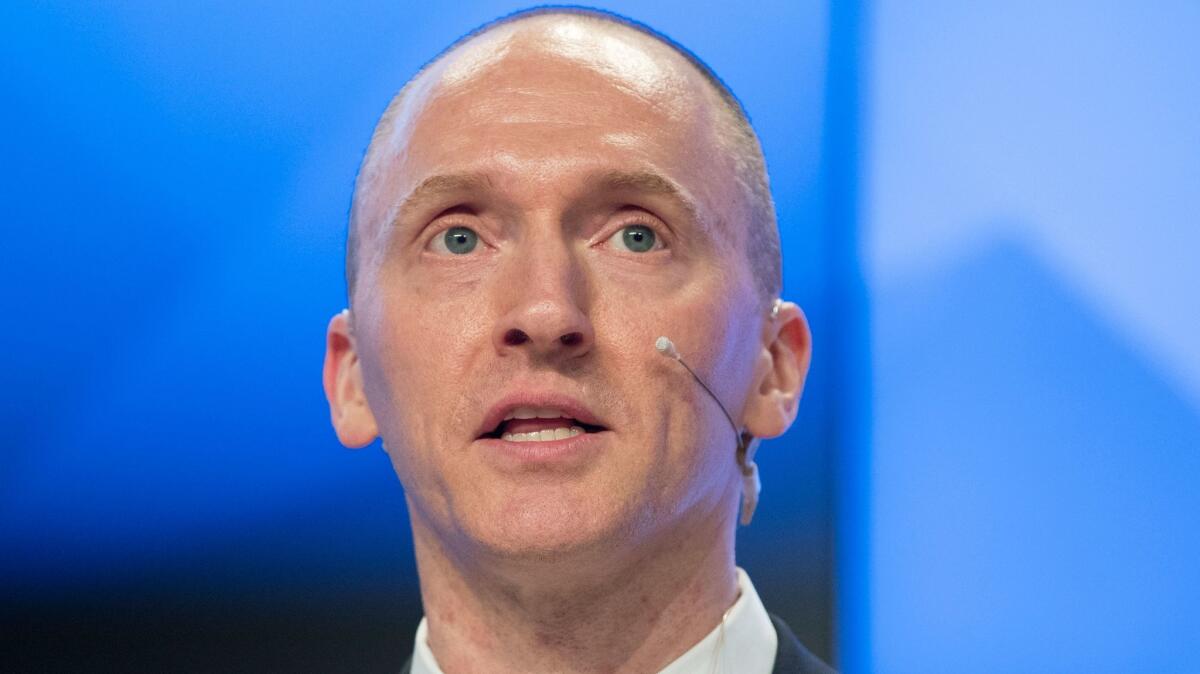
April 27
Pentagon investigation
The Pentagon inspector general is investigating whether Flynn violated military rules by accepting foreign payments from Russia and Turkey, which is disclosed by a House committee. According to documents released, Flynn was warned in 2014, when he was retiring from the military, not to accept payments from foreign governments without advance approval from the Pentagon.
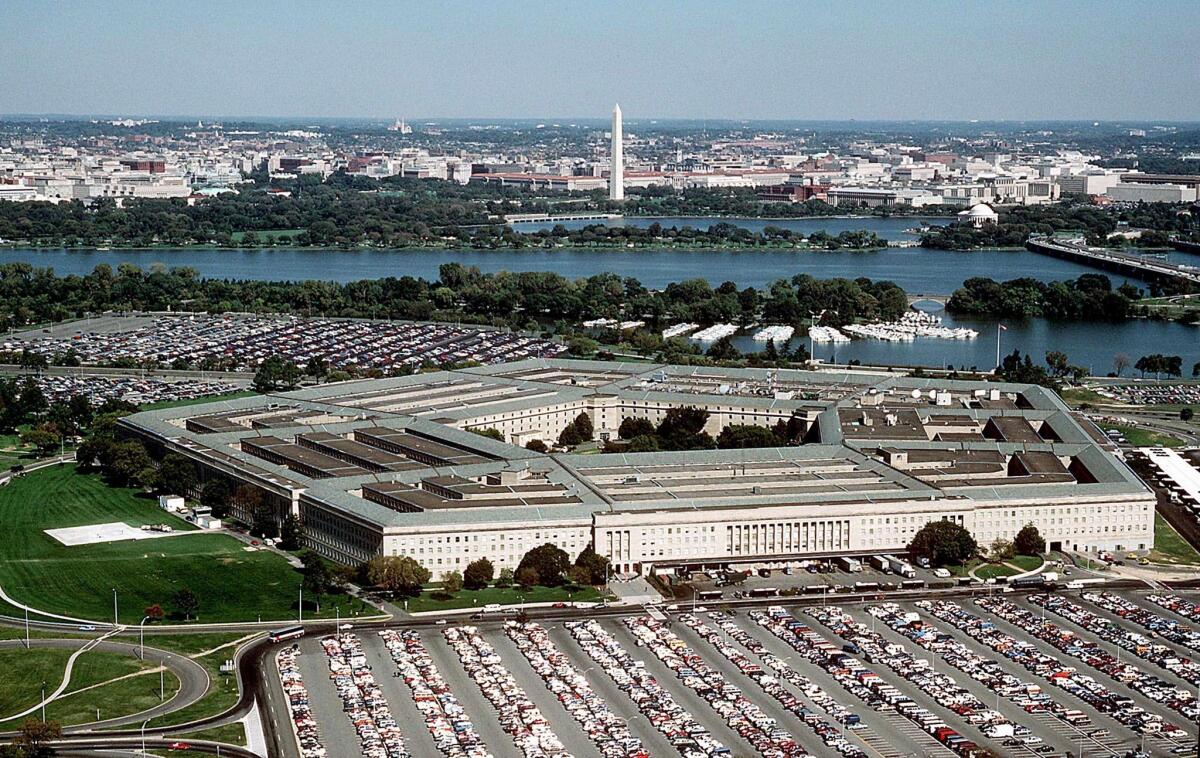
May 2
Trump and Putin speak
For the first time since tensions rose over U.S. missile strikes on a Syrian air base, Trump and Putin talk by phone. After those strikes, Trump had said relations with Russia “may be at an all-time low.” White House officials later said that during this phone call, Putin asked Trump to meet with Russian officials.
May 2
Trump tweets that ‘Comey was the best thing that ever happened to Hillary Clinton’
May 3
Comey testifies
Comey defends his decision to alert Congress just days before the presidential election that he would further investigate Hillary Clinton’s emails.
“It makes me mildly nauseous to think that we might have had some impact on the election,” he said.
May 8
Yates testifies
Yates, the former acting attorney general, testifies that she warned the Trump administration about Flynn on three occasions. On the same day, former Obama administration officials confirm that Obama had warned Trump about Flynn, just two days after the election.
MAY 8
Trump says ‘Russia-Trump collusion story is a total hoax’
May 9
Trump fires Comey
Trump ousts Comey, and the White House releases memos from Deputy Atty. Gen. Rod Rosenstein and Atty. Gen. Jeff Sessions. Rosenstein ties his recommendation to dismiss Comey to his handling of the Clinton email investigation.
In his dismissal letter to Comey, Trump includes this passage: “While I greatly appreciate you informing me, on three separate occasions, that I am not under investigation, I nevertheless concur with the judgment of the Department of Justice that you are not able to effectively lead the bureau.”
The White House says that in addition to Trump and the Justice Department, the FBI’s “rank-and-file had lost confidence in their director.”
May 10
Trumps meets with Russians
Trump meets with Russian Foreign Minister Sergey Lavrov and Russian Ambassador Sergey Kislyak at the White House.
The New York Times later reported that during their meeting Trump said, “I just fired the head of the FBI. He was crazy, a real nut job.”
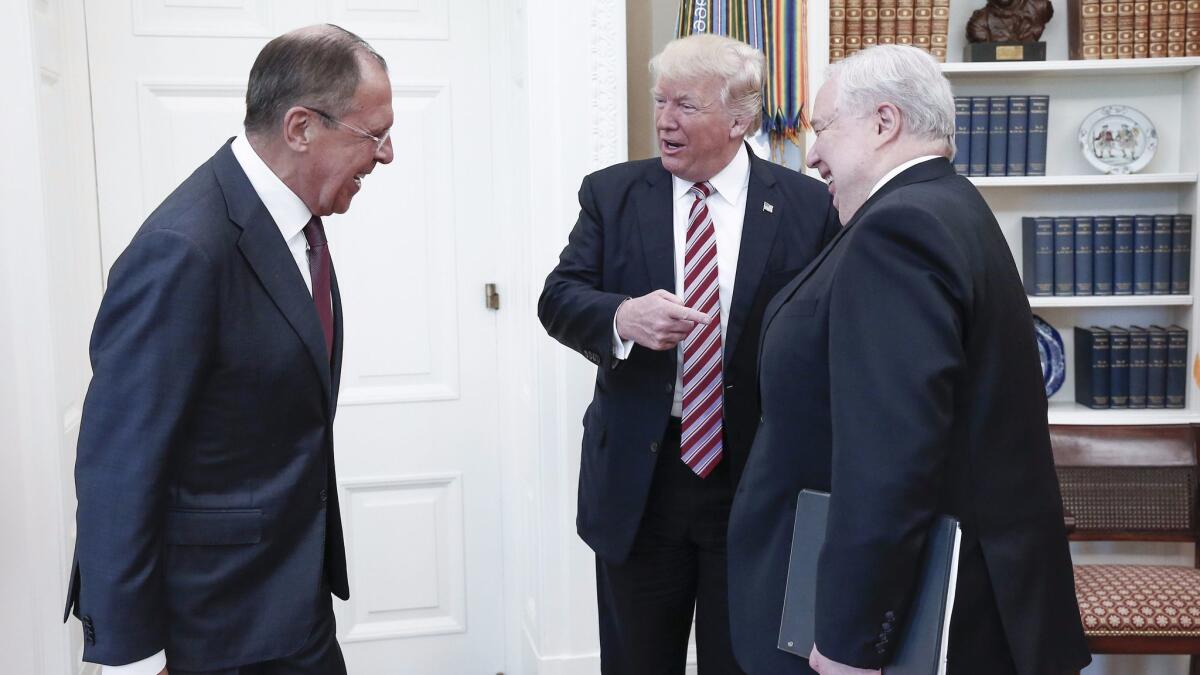
May 11
Holt interview
NBC News’ Lester Holt interviews Trump about Comey’s firing. Holt asks Trump whether Comey was truthful in telling the president that he wasn’t under investigation. Trump responds: “I know that I’m not under investigation. Me. Personally. I’m not talking about campaigns; I’m not talking about anything else.”
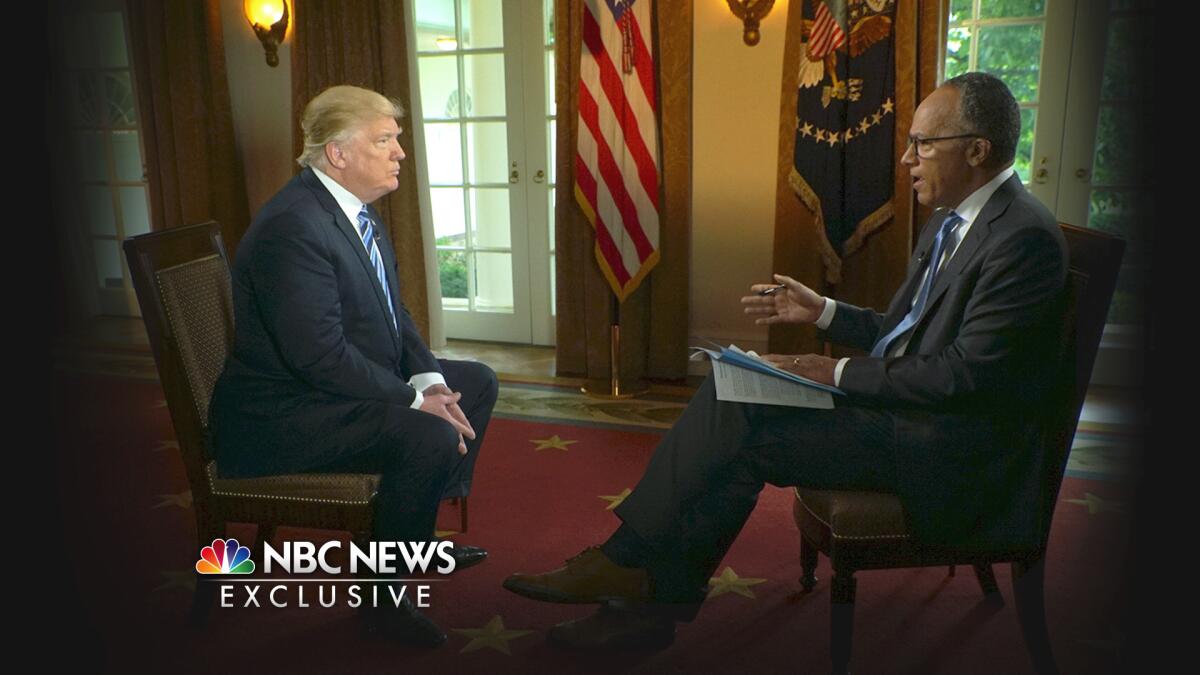
May 11
McCabe backs Comey
Acting FBI Director Andrew McCabe, testifying at a Senate Intelligence Committee hearing, contradicts the White House when asked whether the rank-and-file of the FBI had lost confidence in Comey.
“No, sir, that is not accurate,” he told Sen. Martin Heinrich (D-N.M.), adding, “I hold Director Comey in the absolute highest regard.”
May 12
Trump references ‘tapes’
Trump tweets, “James Comey better hope that there are no ‘tapes’ of our conversations before he starts leaking to the press!”
May 15
Classified intelligence
The Washington Post reports that Trump shared highly classified information about Islamic State with Russian diplomats during a meeting the previous week. The information came, according to the report, from a source that had not authorized the U.S. to share it with the Russians.
May 16
Report, citing memo, says Trump asked Comey to end Flynn inquiry
The New York Times reports that a memo written by Comey to document a Feb. 14 conversation with Trump includes Comey’s account of the president asking him to end the Flynn investigation. Comey would confirm that information in his June testimony.
May 17
Putin offers to release meeting records
Putin calls the concern over the Trump administration’s ties to Russia “political schizophrenia.” He also offers to share Russian records of the meeting between Trump and Lavrov with the U.S. Congress, if the White House approves.
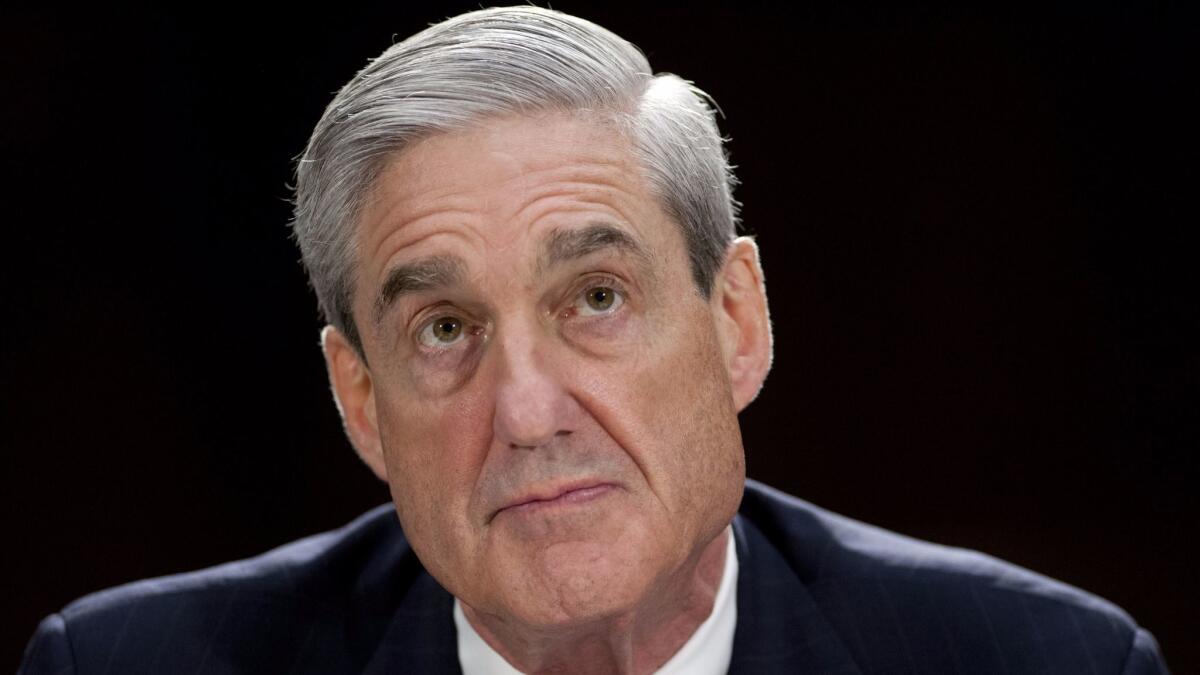
May 17
Mueller named special prosecutor in Russia inquiry
Former FBI Director Robert S. Mueller III is named the special counsel to take over the Justice Department’s Russia investigation.
May 18
Trump refers to Russia inquiry as a ‘witch hunt’
May 19
FBI investigates another White House aide
News outlets report that the FBI is investigating a Trump aide in connection to the Russia inquiry. Six days later, it was revealed that it is Trump’s son-in-law, Jared Kushner.
May 22
Report says Trump asked intelligence officials to deny existence of collusion
The Washington Post reports that at a meeting in March, Trump asked Director of National Intelligence Dan Coats and National Security Agency Director Adm. Michael S. Rogers to publicly deny any existence of evidence that the Trump campaign coordinated with Russia. The Post’s sources said the men did not comply.
May 23
Coats is questioned about meeting
During a Senate Armed Services Committee meeting, Coats is asked about the Washington Post report.
“It’s not appropriate for me to comment publicly on any of that,” he says.
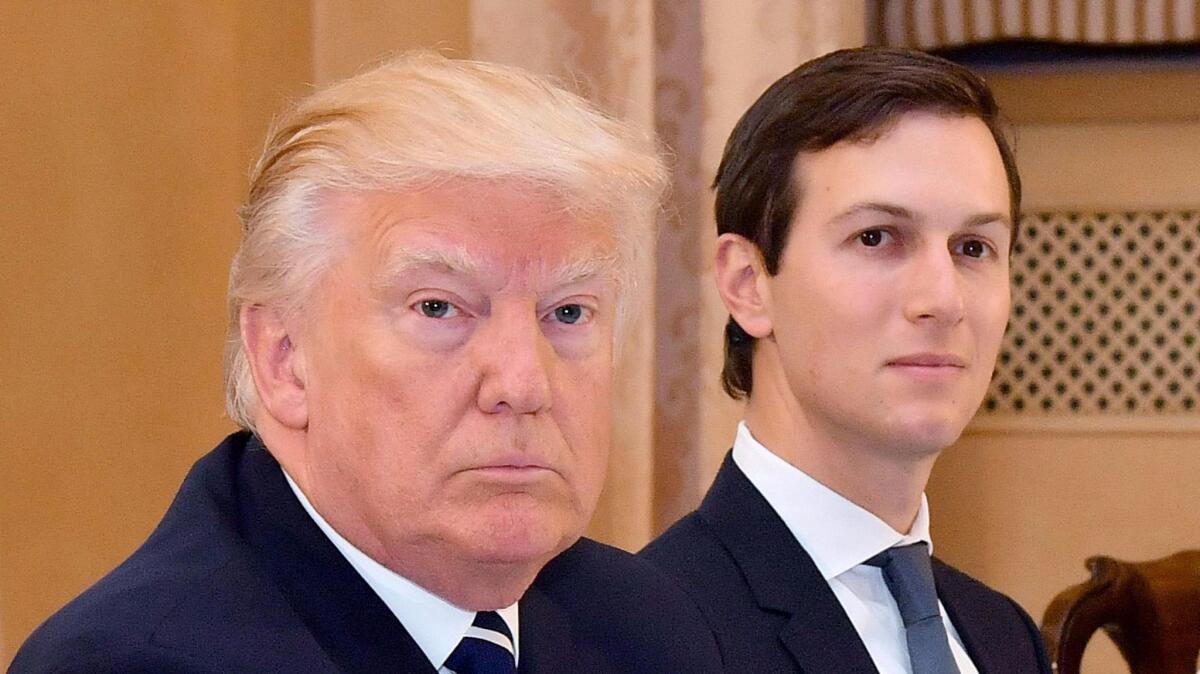
May 26
Kushner asked for back channel to communicate with Russia, report says
The Washington Post reports that Trump’s son-in-law proposed a private back channel between the Kremlin and Trump’s transition team during a meeting in December.
June 5
NSA contractor leaks documents to news organization
Reality Leigh Winner, an NSA contractor with a top security clearance, is arrested for allegedly leaking classified documents to the Intercept about Russian hacking during the election.
Winner’s arrest marks the first time under the Trump administration that someone was charged with leaking classified information.
June 7
Comey’s opening statement is released
One day before he testifies before the Senate Intelligence Committee, Comey’s seven-page opening statement is released. It details five one-on-one meetings that Comey had with Trump, either in person or by phone.
The statement says Trump asked Comey to drop the investigation on Flynn, lift the “cloud” of the Russia investigation and publicly state that Trump was not under investigation.
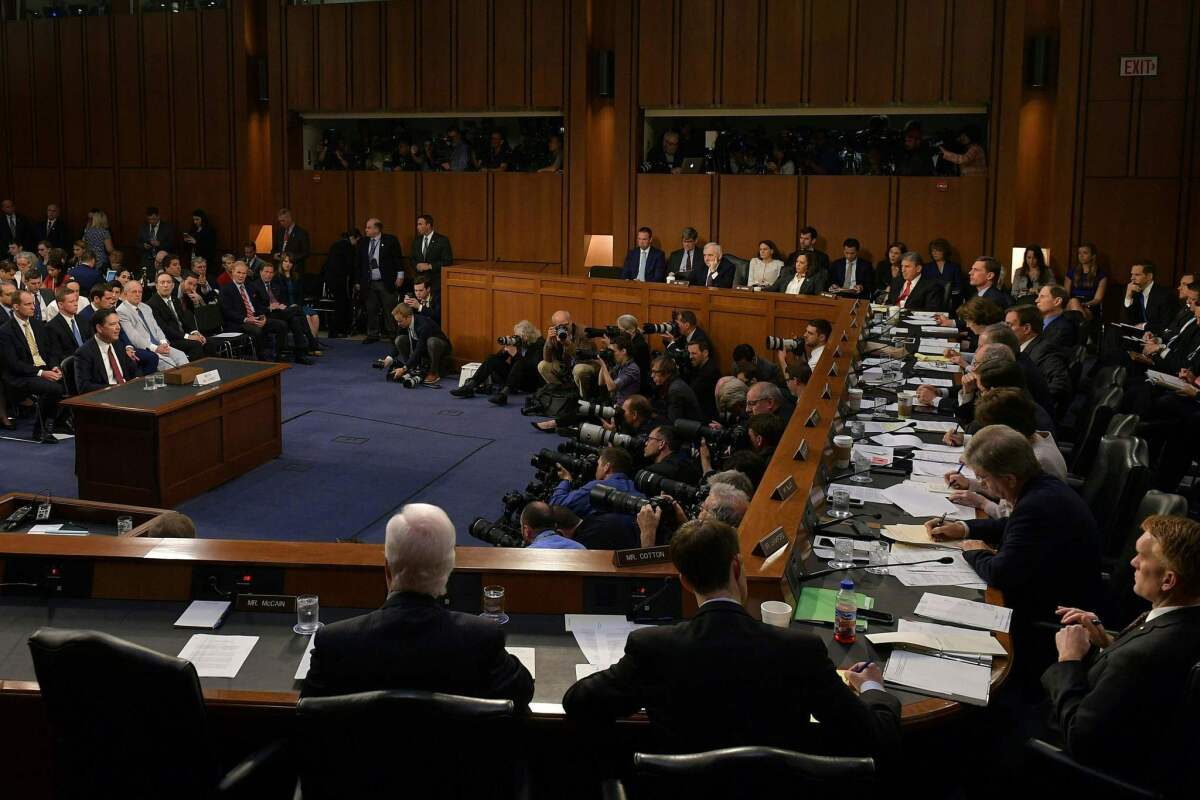
June 8
Comey testifies
During his testimony, Comey addresses 15 senators’ questions over the course of three hours. In regards to the Russia investigation, he says:
- There’s “no doubt” that Russia meddled in the U.S. election.
- He took Trump’s expression of “hope” that he end the Flynn investigation as a directive.
- He won’t publicly discuss the FBI investigation of Flynn or possible coordination between the Trump campaign and Russia during the election.
June 13
Sessions testifies
Less than a week after Comey testifies, the spotlight turns to Sessions, the attorney general. During nearly three hours of answering Senate Intelligence Committee questions about his actions pertaining to the Russia investigation, he:
- Says he does not remember meeting any Russia diplomat at the Mayflower Hotel.
- Denies colluding with Russia.
- Says he in effect had recused himself from the Russia inquiry from his first day on the job, before he officially did so, and had never been briefed on the status of the investigation. He says his letter to Trump recommending Comey’s firing did not conflict with his recusal.
June 14
Washington Post says Trump is being personally investigated
The Washington Post, in an exclusive story, reports that officials requesting anonymity have confirmed Mueller, the special counsel, is investigating Trump for possible obstruction of justice. The Post notes that this is a major development in the Russia investigation, as Trump had previously been told that he, personally, was not under investigation.
“The FBI leak of information regarding the President is outrageous, inexcusable and illegal,” said Mark Corallo, a spokesman for Trump’s lawyer Marc Kasowitz.
June 20
Senior officials were concerned Flynn was susceptible to blackmail in January, report says
The New York Times reports that despite a concern in January among senior government officials that Flynn was vulnerable to Russian blackmail, he sat in earshot of CIA Director Mike Pompeo’s daily briefings to Trump nearly every day for three weeks.
June 22
Trump tweets that he doesn’t have any tapes
Forty-one days after Trump tweeted “Comey better hope there are no ‘tapes,’” the president puts a damper on the rumor he started.
“I did not make, and do not have, any such recordings,” he tweets.
UPDATES:
5 p.m., June 22: This article was updated with information from June 20 and 22.
5 p.m., June 14: This article updates with details from Sessions’ testimony before a Senate committee and the Washington Post report on a change in the scope of the investigation.
12:45 p.m., June 8: This article has been updated with news from May 18 onward.
3:15 p.m., May 17: This article was updated with news about Mueller.
8:14 a.m., May 17: This article was updated with reporting on phone calls between Trump and Putin and on Putin’s offer to share meeting records with the U.S. Congress.
This article was originally published May 16 at 8 p.m.
Questions? Comments? Tweet @cshalby and @finneganLAT or email [email protected] and [email protected].
ALSO:
Why the Comey memo could be so explosive for Trump
Q&A: Here’s what you need to know about Comey’s memo on a conversation with Trump